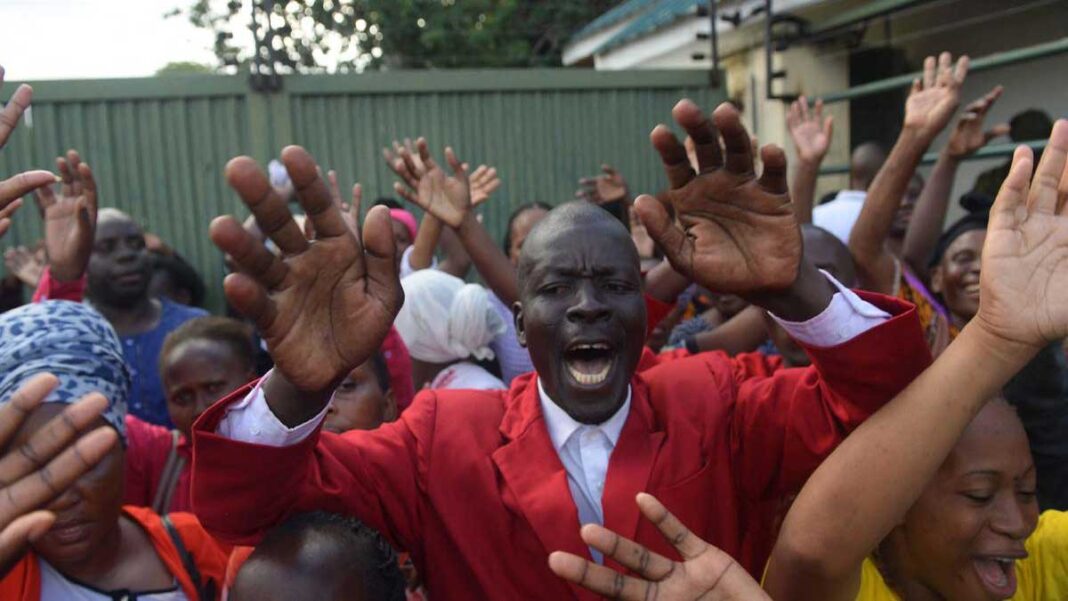Doomsday cult led by Pastor Makenzi Nthenge in Shakahola, Kilifi County left Kenyans in shock from its activities.
This is not the first time such a thing is happening in the world. There are several cases in developed societies like the Americas and Japan.
According to retired PCEA prelate, Rev Timothy Njoya one common thread in these cults is their target – the vulnerable members of the society.
What they offer in most Doomsday cults is fear; in most cases, it’s the end time fear. That the world is coming to an end or Jesus is coming back.
A cult describes a relatively small group of people who are led by a charismatic and self-appointed leader. The leader controls the members by seeking unwavering devotion to a set of beliefs and practices.
Doomsday cult tend to isolate members from their families and friends. They also call their members to sacrifice their property and jobs to serve their leader. In most cases, leaving a cult comes with dire consequences.
The irony is these churches begin small like any other. One thing leads to another and as the church grows, the leader also grows in other ways. Members rarely realize when it crosses the line from a church to a cult.
Pastor Makenzi, a former taxi driver ran a TV station under his ministry at some point but he later sold it. He cast a picture of a man with nothing to hide.
Near deity status
One trait across all Doomsday cults is a leader operating without accountability. He assumes near-deity status and no questions can be raised against him from within and without the close-knit group. The next stage is members believing that only the teachings of their leader are right and everyone else is wrong.
The next step is exclusivity, cutting links with the community by avoiding schools, hospitals, and government services.
Around 2006, an American by the name of Yisrayl “Buffalo Bill” Hawkins was very popular in Texas. The founder of the House of Yahweh sect made his way in Kenya in 1997 and gained a good number of followers.
The sect’s operations went on quietly until 2006 when their leader prophesied that the world will end on September 12, 2006. They became the focus of Kenyans and the government.
Members sold their possessions and withdrew their children from school.
They dug underground bunkers and kept good amounts of food (for the journey to heaven) to wait for some nuclear bomb to destroy the earth.
Moshe Sang was one of their local leaders. He told a press conference that a nuclear bomb will be launched from the under the sea and blow up the whole world.
As this drama unfolded, the police went in and broke up their Doomsday cult meetings and took them out of the bunkers. They were arrested but released after a few days with the promise to keep their doomsday predictions to themselves.
A few days before the Doomsday, Sang was up again showing the equipment they had bought, gas masks, goggles, and long coats. September 12 came and passed and they became a laughing stock. The House of Yahweh fizzled away.
In the year 2000, over 500 people were burned beyond recognition in western Uganda. They had been told that the world will end at the turn of the new millennium.
The members of the Doomsday cult Movement for the Restoration of the Ten Commandments of God locked themselves inside their church in Kanungu District and set it aflame.
Their leaders, Credonia Mwerinde and Joseph Kibwetere, were never traced despite an international arrest warrant against them. Just like in the Shakahola case, Ugandans questioned how security organs failed to flag the sect’s dealings.
Around the same time, another sect popped up in Western Kenya. New Holy Ministry Church in Kenya also known as Choma had its headquarters in Lugari, Kakamega County.
They also preached that the world will end at the end of the 20th century. They denied any links to the Ugandan Doomsday cult.
Their over 2,000 members dressed in robes, withdrew their children from schools and did no meaningful economic activity.
They slept in their robes and lived in exclusive communities. In anticipation of the end of the world, they were told to sell their earthly belongings and give the money to the church leaders. Members even sold land and handed over the money to the leaders.
They became hostile to anyone who was opposed to their teachings. They assaulted them and even burned down some houses.
December 31, 2000, came, and people slept and woke up on Earth. Hell broke loose.
Members went looking for their leaders to refund their money because their prophecy had not come to pass, but their leaders went missing and Choma Doomsday cult died a slow death.
The leadership of the church remained anonymous to the end and were believed to be living large somewhere from the money their members contributed.
Lest you forget the self-proclaimed god, Jehovah Wanyonyi of Uasin Gishu County. I will leave Jesus of Tongaren for now. We tend to ignore these cults as long as no life is lost or the rights of those who do not subscribe to them are not breached.
Jehovah Wanyonyi died but we have never asked how he was buried or how his Doomsday cult followers are conducting their business. So much for freedom of worship.

